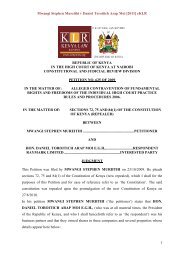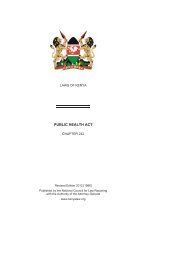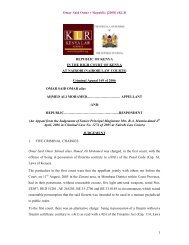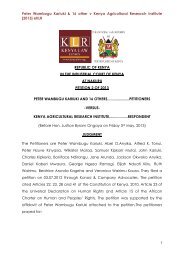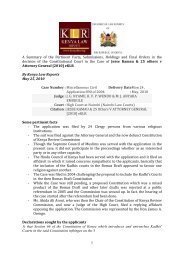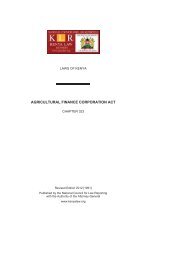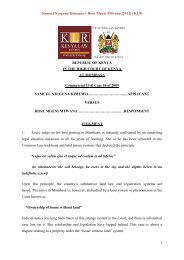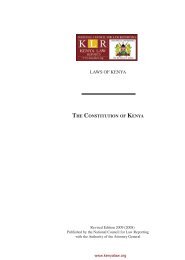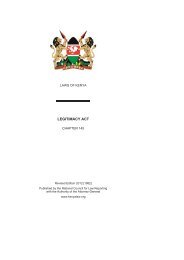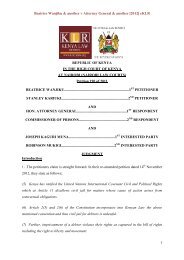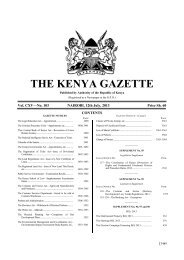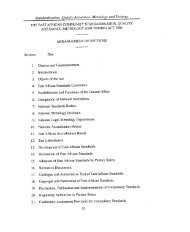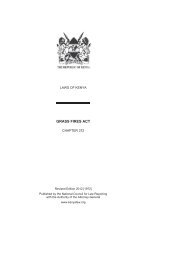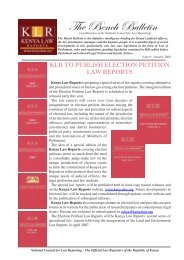Bench Bulletin - Issue 12 - Kenya Law Reports
Bench Bulletin - Issue 12 - Kenya Law Reports
Bench Bulletin - Issue 12 - Kenya Law Reports
Create successful ePaper yourself
Turn your PDF publications into a flip-book with our unique Google optimized e-Paper software.
KENYA LAW REPORTS<br />
BENCH BULLETIN<br />
FROM THE COURTS — HIGH COURT<br />
the magistrate’s court erred by admitting the P3 form without calling the maker and without giving the appellant a<br />
chance to object or admit to it. Finally it was the appellant’s submission that the language used during the trial and<br />
whether or not it was understood by the appellant was not on record.<br />
Counsel for the state in objecting to the appeal, submitted that there was no defect in the charge and that the use of<br />
the words “unlawful carnal knowledge” did not make it defective.<br />
Held:<br />
1. The law on use of language was very clear. The language used at the trial did not have to be the accused person’s<br />
mother tongue, nor the language of his choice. All it needed to be was a language clearly understood by the accused.<br />
2. “Causing penetration with a child” and “carnal knowledge” described the same act. It was just a question of<br />
semantics. Penetration was actually a detail of the act but both terms simply meant having sexual intercourse. The fact<br />
that “carnal knowledge” appeared in the Penal Code (Cap 63) and not in the Sexual Offences Act of 2006, did not outlaw<br />
its use in the particulars of the offence. Therefore the use of the said words was not prejudicial to the appellant at all.<br />
3. A retraction would only have arisen if an accused person raised a defence admitting the facts e.g if an accused’s<br />
answer to a charge of murder was, “It is true, I admit the fact but I did not intend to kill him,” that would have completely<br />
negated a plea in that case. However, in a case of defilement it mattered not whether the child gave its consent or whether<br />
she was agreeable to the sexual intercourse. This was a statutory offence and the issue of consent or agreeability would<br />
not arise. Saying that the girl was agreeable did not therefore negate the plea. It did not make it equivocal.<br />
4. Section 77 of the Evidence Act (Cap 80) provided, that in criminal proceedings any document that purported to<br />
be a report under the hand of a Government analyst, medical practitioner or any ballistics expert, document examiner<br />
or geologist upon any person, matter or thing submitted to him for examination or analysis could be used in evidence.<br />
The court could presume that the signature to any such document was genuine and that the person signing it held the<br />
office and qualifications which he professed to hold at the time when he signed it. When any report was so used the<br />
court could, if it thought fit, summon the maker and examine him as to the subject matter thereof. Therefore the P3<br />
form was admissible and since it was not a hearing where viva voce evidence was being adduced, there could not have<br />
been any cross-examination or need to call the maker of the document.<br />
Appeal dismissed<br />
The Hon. Justice Fred A.<br />
Ochieng<br />
Rights of an Accused Person to be Brought to Court within 14 Days of Arrest<br />
Republic v Desmond Mukhaya Mulusa [2010] eKLR<br />
Criminal Case 86 of 2007<br />
April 20, 2010<br />
Judge: Fred A. Ochieng J.<br />
High Court at Nairobi<br />
Reported by Njeri Githang’a<br />
Constitutional <strong>Law</strong>- fundamental rights and freedoms- rights of an accused person- right<br />
to be brought to court within 14 days after arrest- applicant accused of murder-detention of<br />
applicant in police custody for 6 months - onus on the police to demonstrate that the accused<br />
had been taken to court as soon as was reasonably practicable- delay caused by delay in<br />
conducting the post-mortem examination of the victim’s body as the family could not be traced<br />
to identify the body- victim’s family inability to raise the mortuary fees and the post-mortem<br />
fees causing further delay in having the post mortem report released-whether the prosecution<br />
had explained the delay satisfactorily-Constitution sections 70 (a), 72 (3) (b) and 77<br />
Constitutional law-fundamental rights and freedoms-rights of an accused person- accused<br />
person presumed innocent until proven guilty-prosecution submitting that if there was any<br />
breach of the constitutional rights of the accused the court had to apply the provisions of<br />
the Constitution in a wholesome manner- rights of the accused to be weighed as against the<br />
rights of the victim- whether the court could use section 71 of the Constitution as a counter-weight to the provisions of<br />
section 72(3)- obligation of the court to give effect to the section 70 of the Constitution- restrictions and limitations of<br />
constitutional rights –rights subject to respect for the rights and freedoms of others and for public interest – where public<br />
interest required the court to determine whether or not the accused was guilty-whether the violation of constitutional<br />
rights of an accused resulted to an automatic acquittal- Constitution sections 70, 71 and 72 (3).<br />
Constitutional law-fundamental rights and freedoms-remedy for breach of- right of the applicant to sue for compensation<br />
under section 72(6) of the Constitution- the provision an integral part of the Constitution-duty of the court to invoke that<br />
section where section 72(3) has been breached-whether failure to bring the applicant to court within the prescribed time<br />
only entitled him to compensation for breach of his rights- Constitution section 72 (6).<br />
<strong>Issue</strong> <strong>12</strong>: April-June 2010<br />
61



